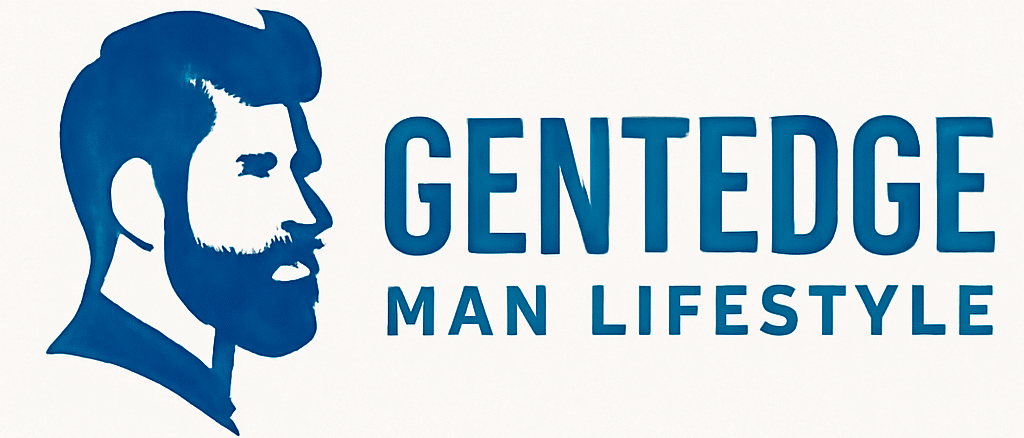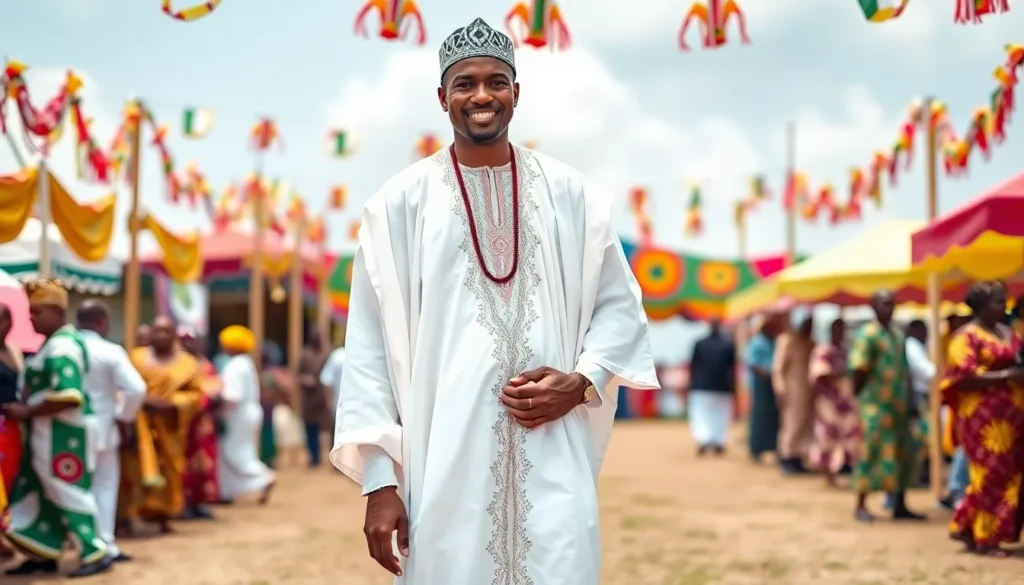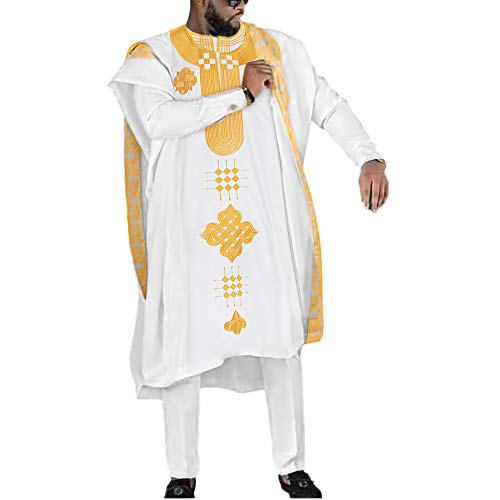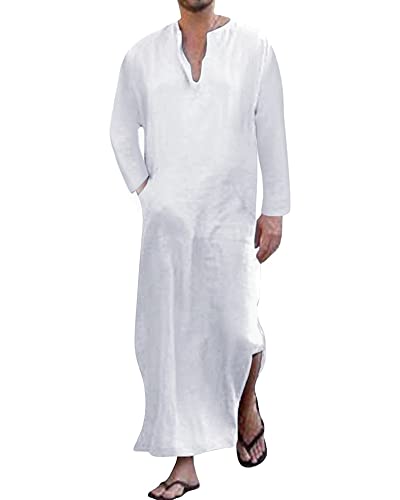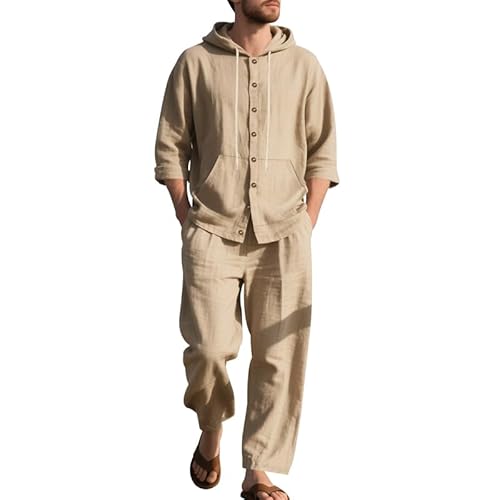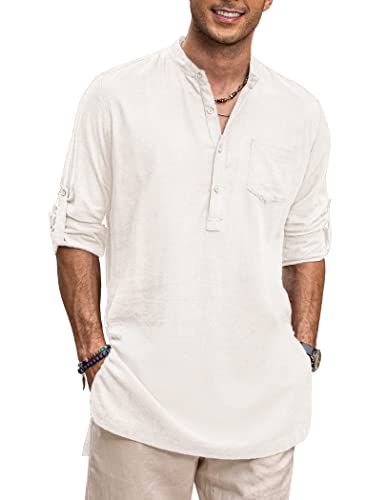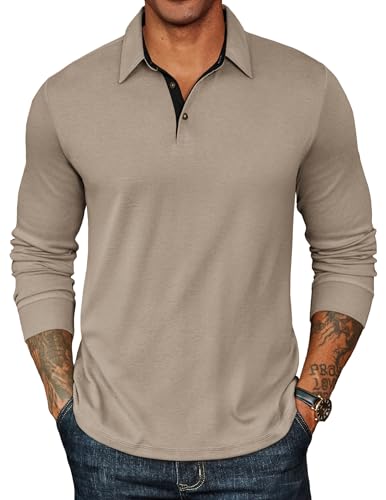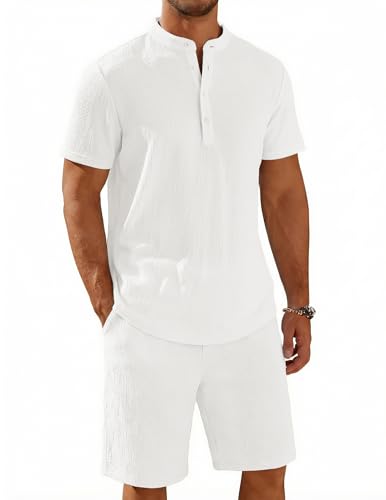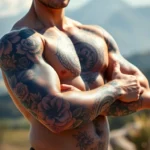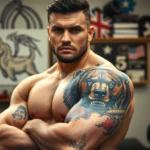Nigerian men’s fashion has evolved dramatically over the years, blending traditional heritage with contemporary style. We’ve witnessed a remarkable shift toward white native wear that perfectly captures elegance and cultural pride in one stunning package.
The crisp, clean aesthetic of white native attire offers Nigerian men a sophisticated way to honor their roots while making a bold fashion statement. Whether you’re attending a wedding, cultural celebration, or important business event, white native wear commands respect and admiration wherever you go.
We’re here to explore why white native clothing has become the go-to choice for fashion-forward Nigerian men who refuse to compromise between style and tradition. From agbada to dashiki designs, these timeless pieces offer versatility that transitions seamlessly from casual gatherings to formal occasions, making them essential additions to every modern Nigerian man’s wardrobe.
Traditional White Nigerian Native Wear for Men: A Cultural Overview
White native wear represents one of Nigeria’s most revered clothing traditions, carrying deep cultural significance that extends far beyond its aesthetic appeal. We find these garments deeply rooted in the ceremonial practices of various Nigerian ethnic groups, where white symbolizes purity, peace, and spiritual connection.
Agbada stands as the most iconic piece of traditional white Nigerian menswear, featuring flowing wide sleeves and intricate embroidery that showcases the wearer’s status and cultural pride. This grand robe originated among the Yoruba people and has become a symbol of Nigerian elegance across all regions. We see the agbada crafted from premium cotton, silk, or linen fabrics that allow for comfortable wear in Nigeria’s tropical climate.
Dashiki offers a more casual yet equally meaningful option, characterized by its symbolic patterns and comfortable fit that makes it perfect for everyday cultural expression. The geometric designs often tell stories of African heritage, with each pattern holding exact meaning within different communities. We appreciate how modern designers have elevated the dashiki while maintaining its traditional essence.
Kaftan provides versatility through its loose fitting design that works beautifully for both formal ceremonies and relaxed social gatherings. This ankle length garment often features elaborate neckline embellishments and sleeve details that reflect regional craftsmanship traditions. We notice that white kaftans are particularly popular during religious celebrations and cultural festivals.
Buba and Sokoto combinations create sophisticated coordinated looks that demonstrate attention to traditional dressing protocols. The fitted buba (shirt) pairs perfectly with the flowing sokoto (trousers), creating a silhouette that’s both dignified and comfortable. We observe that this combination allows for personal expression through varying degrees of embellishment and tailoring details.
These traditional white garments continue to play essential roles in Nigerian ceremonies, from naming ceremonies to traditional weddings, where their cultural significance enhances the spiritual and social importance of these life events.
Classic White Agbada: The Quintessential Nigerian Men’s Formal Wear
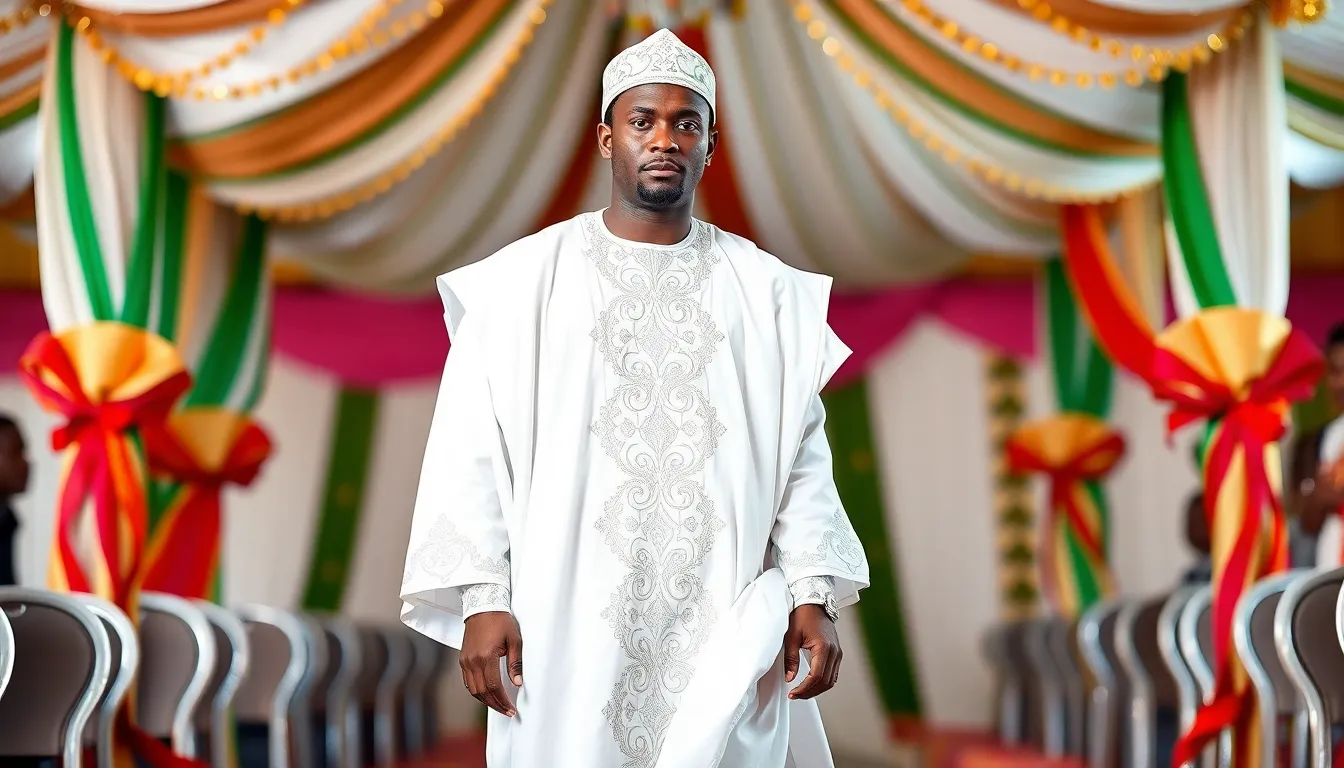
We recognize the white Agbada as the pinnacle of Nigerian formal wear, representing centuries of cultural refinement and masculine elegance. This flowing wide-sleeved robe worn over matching trousers creates a distinguished silhouette that commands respect at any gathering.
Traditional Embroidered Designs
Intricate hand-embroidered patterns define the classic white Agbada’s authentic appeal. We see elaborate Dabka embroidery adorning the chest, neckline, and sleeves, featuring motifs that tell stories of Nigerian heritage and craftsmanship. These traditional designs vary significantly across different ethnic groups and regions, with each pattern carrying exact cultural meanings and historical significance.
Master artisans spend weeks creating these detailed embroideries, using techniques passed down through generations. We appreciate how these decorative elements transform a simple white robe into a masterpiece that reflects the wearer’s cultural identity and social status.
Modern Minimalist Styles
Contemporary fashion has embraced sleeker interpretations of the white Agbada without compromising its traditional essence. We observe designers incorporating lighter, more breathable fabrics that enhance comfort while maintaining the garment’s dignified appearance. These modern versions feature subtle embroidery or completely plain finishes that appeal to fashion-forward men seeking sophisticated simplicity.
Slimmer cuts now complement the traditional flowing design, making the garment more versatile for various occasions. We notice these minimalist styles attract younger generations who value both cultural connection and contemporary aesthetics.
Ceremonial Occasion Variations
Weddings and naming ceremonies showcase the white Agbada’s most ornate expressions. We see grooms and distinguished guests wearing heavily embellished versions complemented by matching Fila caps, embroidered staffs, and traditional beads. These ceremonial variations often feature custom designs that align with exact event themes and family traditions.
Religious events also call for special white Agbada styles that emphasize purity and spiritual significance. We understand how these occasion-exact variations allow men to honor traditions while expressing personal style and celebrating life’s most important moments.
Elegant White Kaftan Styles for Nigerian Men
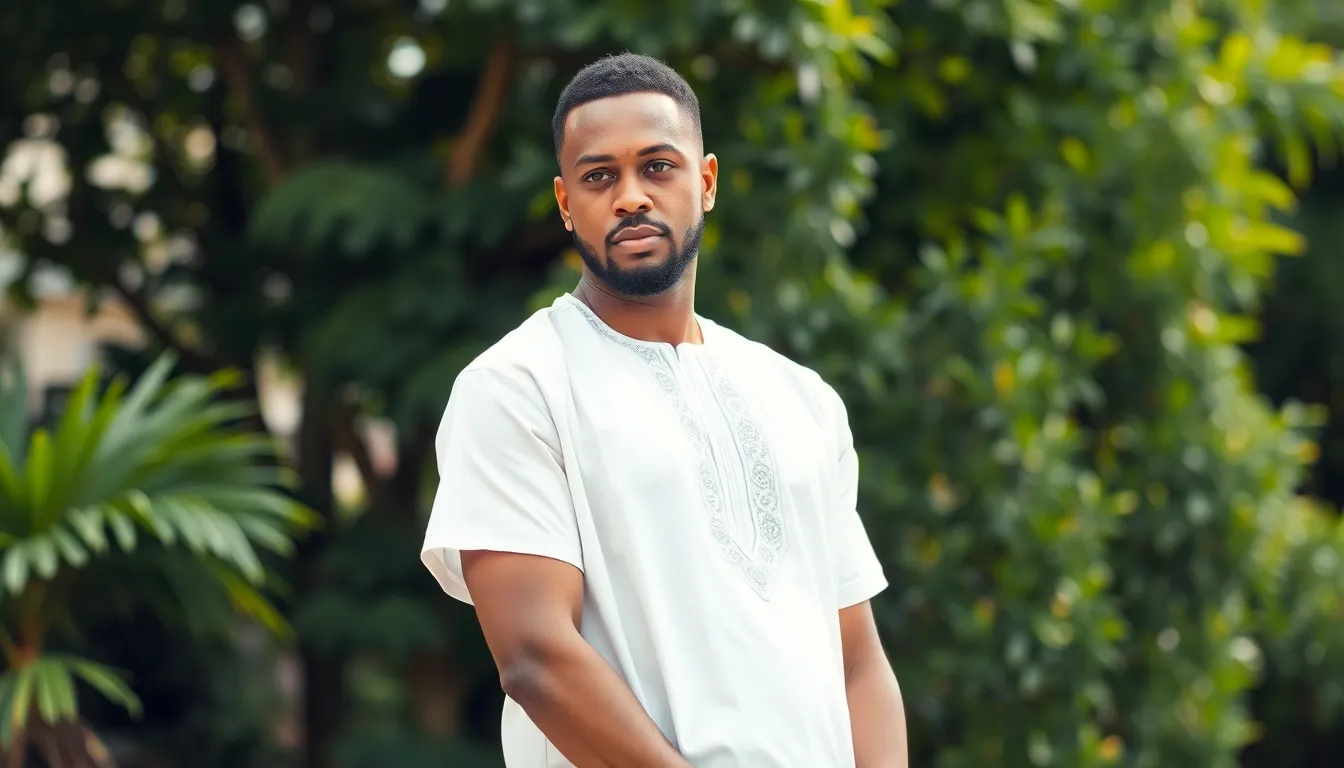
White kaftans represent a perfect blend of traditional Nigerian craftsmanship and modern style preferences. These versatile garments offer Nigerian men sophisticated options that honor cultural heritage while embracing contemporary fashion trends.
Short-Sleeve Contemporary Kaftans
Short-sleeve kaftans deliver comfort and refined casual elegance for everyday wear and semi-formal events. These modern interpretations blend traditional Nigerian designs with contemporary aesthetics, creating clean lines and minimal embellishments that appeal to men who prefer understated sophistication.
Contemporary styling makes these kaftans perfect for business casual settings, weekend gatherings, and relaxed social occasions. We’ve observed that fashion-forward Nigerian men increasingly choose these versatile pieces because they’re breathable in tropical climates while maintaining a polished appearance. The streamlined silhouette works exceptionally well with modern accessories and footwear choices.
Long-Sleeve Traditional Kaftans
Long-sleeve kaftans showcase deep Nigerian heritage through high-quality fabrics like premium cotton and wool construction. These formal pieces excel at weddings, religious ceremonies, and cultural festivals where traditional elegance takes center stage. Subtle embroidery or intricate patterns around necklines and cuffs enhance their authentic cultural appeal.
Traditional craftsmanship shines through in every detail, from the carefully selected fabrics to the precise tailoring that creates a dignified silhouette. We recommend these kaftans for occasions that call for cultural reverence and formal presentation. The longer sleeves provide coverage appropriate for religious settings while the flowing design allows comfortable movement during ceremonial activities.
Embellished Festival Kaftans
Festival kaftans feature intricate embroidery, beadwork, and applique work that transforms them into stunning statement pieces. These highly decorative garments reflect cultural richness and personal status through their elaborate craftsmanship and attention to detail. Custom-made options often incorporate luxurious fabrics like silk or premium wool to create truly exceptional pieces.
Embellished designs serve as conversation starters at cultural celebrations and formal gatherings where making a memorable impression matters most. We’ve noticed that these ornate kaftans become family heirlooms passed down through generations, carrying both artistic value and cultural significance. The combination of traditional techniques with precious materials creates wearable art that celebrates Nigerian heritage in its most spectacular form.
Distinguished White Senator Wear for Men
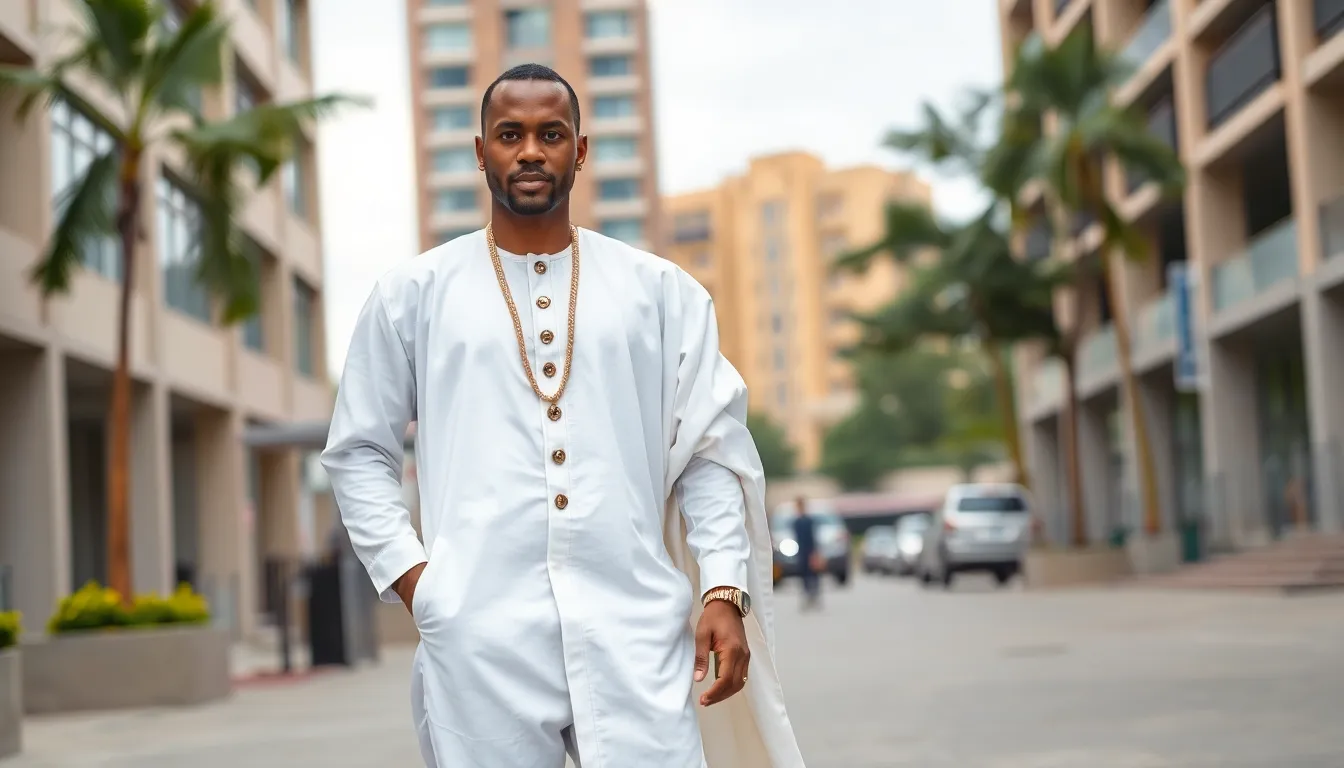
We recognize the white senator wear as Nigeria’s premier formal menswear choice, combining traditional elegance with contemporary sophistication. This distinguished outfit features a long tunic paired with matching trousers, crafted from premium fabrics like cotton, wool, or cashmere wool that symbolize prestige across West African fashion circles.
Classic Plain Senator Styles
Classic plain white senator styles embrace minimalist design principles that prioritize exceptional tailoring over elaborate decoration. We’ve observed these timeless pieces typically feature 100% cotton or wool construction, delivering both comfort and refined appearance for versatile occasions. Clean lines define the silhouette while high-quality fabric ensures durability and elegance. Simple yet sophisticated cuts make these styles perfect for everyday business settings or formal gatherings where understated luxury speaks volumes.
Decorative Trim Variations
Decorative trim variations elevate plain senator wear through carefully placed embellishments that enhance rather than overwhelm the design. We notice popular options include geometric patterns along necklines, subtle lace overlays on chest pockets, and contrast stitching on cuffs that showcase superior craftsmanship. Traditional motifs often appear as embroidered details that reflect cultural heritage while maintaining the garment’s sophisticated appeal. Strategic placement of these decorative elements creates personalized touches that distinguish individual style preferences.
Business Formal Senator Options
Business formal senator options adapt traditional Nigerian menswear for professional environments through customized fits and complementary accessories. We recommend pairing these outfits with matching or coordinating trousers to create polished looks suitable for offices and formal meetings. Quality leather shoes, particularly senator shoes designed for elegance and comfort, complete the professional appearance. Contemporary styling allows for loafers or premium sneakers that modernize the traditional silhouette while maintaining business appropriate standards.
Sophisticated White Dashiki Designs for Nigerian Gentlemen
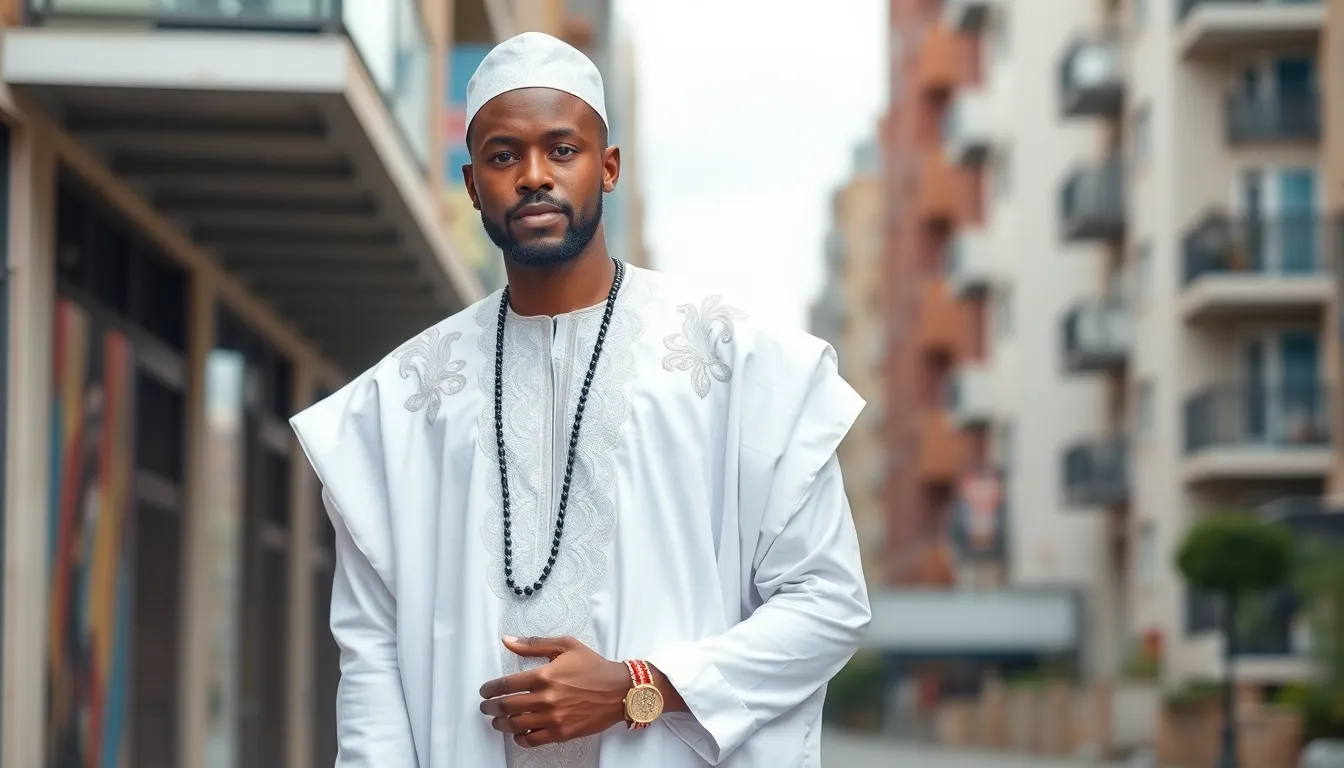
The white dashiki stands as a versatile cornerstone of Nigerian men’s fashion, offering unmatched flexibility for both casual and formal occasions. We explore the diverse design variations that make this traditional garment a sophisticated choice for discerning gentlemen.
Authentic Traditional Patterns
Classic African patterns define the essence of authentic white dashikis, featuring intricate embroidery and motifs that celebrate Nigerian cultural heritage. Yoruba-inspired designs dominate these traditional pieces, showcasing geometric patterns and symbolic elements that connect wearers to their ancestral roots. Premium fabrics like silk brocade and pure cotton elevate these garments, ensuring both cultural authenticity and exceptional quality.
Artisans create these traditional dashikis using time-honored techniques, incorporating hand-embroidered details that vary across different ethnic groups. Each pattern tells a story, representing exact cultural meanings and regional traditions that have been preserved for generations. The rich textures and traditional colorwork create depth and visual interest while maintaining the garment’s ceremonial significance.
Contemporary Urban Styles
Modern dashiki designs embrace sleek cuts and minimalist embroidery, appealing directly to younger generations and urban professionals. Designers balance cultural symbolism with current fashion trends, creating pieces suitable for casual outings and semi-formal workplace environments. These contemporary interpretations maintain traditional essence while incorporating modern tailoring techniques and streamlined silhouettes.
Urban-style white dashikis feature subtle embroidery patterns and clean lines that complement modern wardrobes effortlessly. Fashion-forward elements like structured shoulders and tapered fits enhance the garment’s versatility, making it appropriate for business casual settings and social gatherings. These pieces demonstrate how traditional African wear can adapt to contemporary lifestyle demands without losing cultural relevance.
Wedding-Ready Dashiki Options
Wedding ceremonies showcase the white dashiki’s most elegant expressions, with pieces designed specifically for celebratory occasions and formal events. These wedding-ready garments feature refined embroidery in gold, black, or subtle patterns that create a regal appearance suitable for grooms and wedding guests alike. Matching trouser sets complement the dashiki, crafted from coordinating fabrics that enhance the overall sophisticated look.
Customized fits ensure comfort throughout long ceremonial events while maintaining a polished appearance that photographs beautifully. Gold-accented embroidery adds luxury touches that reflect the significance of wedding celebrations, making these pieces worthy of such important milestones. The symbolism of purity and celebration associated with white dashikis makes them particularly meaningful choices for matrimonial occasions and other life-changing events.
Premium White Buba and Sokoto Combinations
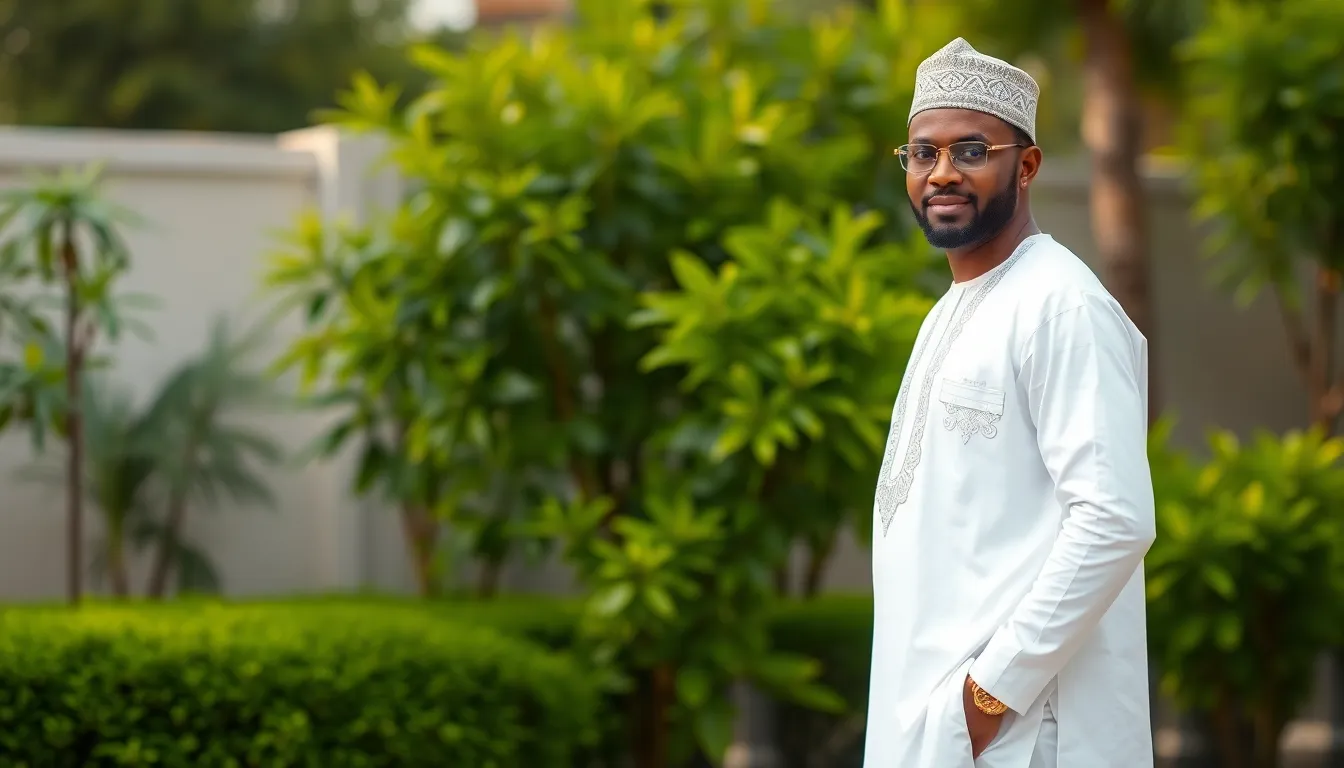
The sophisticated buba and sokoto combination represents one of Nigeria’s most elegant traditional menswear options. This distinctive ensemble perfectly balances cultural authenticity with contemporary fashion sensibilities.
Traditional Yoruba Styling
Traditional Yoruba styling forms the foundation of premium white buba and sokoto combinations, showcasing centuries of cultural heritage through flowing robes and embroidered detailing. We see authentic craftsmanship reflected in the loose-fitting buba top that’s expertly paired with fitted sokoto trousers, creating an elegant and cohesive look that honors ancestral traditions.
Premium fabrics like Aso Oke enhance the ceremonial value of these garments, bringing rich textures that elevate the overall aesthetic. Cultural authenticity shines through when we complement these outfits with traditional Yoruba accessories such as the fila cap, which serves as the perfect finishing touch.
Embroidered detailing adds sophisticated visual interest while maintaining the garment’s traditional essence. We appreciate how these design elements tell stories of Yoruba culture through intricate patterns and motifs that have been passed down through generations.
Modern Customized Fits
Modern customized fits have revolutionized the traditional buba and sokoto combination, introducing slimmer cuts and refined tailoring that appeal to contemporary fashion preferences. We’ve witnessed this evolution create versatile garments that work equally well for traditional ceremonies and contemporary formal events.
Contemporary silhouettes maintain traditional design elements while offering sharp, modern lines that flatter the male form. Premium quality white fabrics symbolize purity and sophistication, making these customized versions perfect for discerning gentlemen who value both heritage and style.
Refined tailoring techniques ensure each piece fits impeccably, transforming the traditionally loose-fitting garments into sophisticated statement pieces. We recommend these modern interpretations for men seeking cultural expression without compromising on contemporary style standards.
Ceremonial Occasion Sets
Ceremonial occasion sets featuring white buba and sokoto combinations are especially favored for weddings, naming ceremonies, and other important formal events. We often see these ensembles chosen for their visual impact and deep cultural symbolism, with the crisp white color representing purity and new beginnings.
Wedding ceremonies showcase these sets at their finest, often paired with flowing agbada outer robes or embroidered caps to complete the ceremonial look. Premium white fabrics create stunning visual presentations that photograph beautifully and command respect at important gatherings.
Formal social events benefit from the sophisticated presence these ceremonial sets provide, allowing wearers to honor tradition while making elegant fashion statements. We find that these sets often become cherished family pieces, passed down through generations as symbols of cultural pride and celebration.
Stylish White Native Shirts for Casual Wear
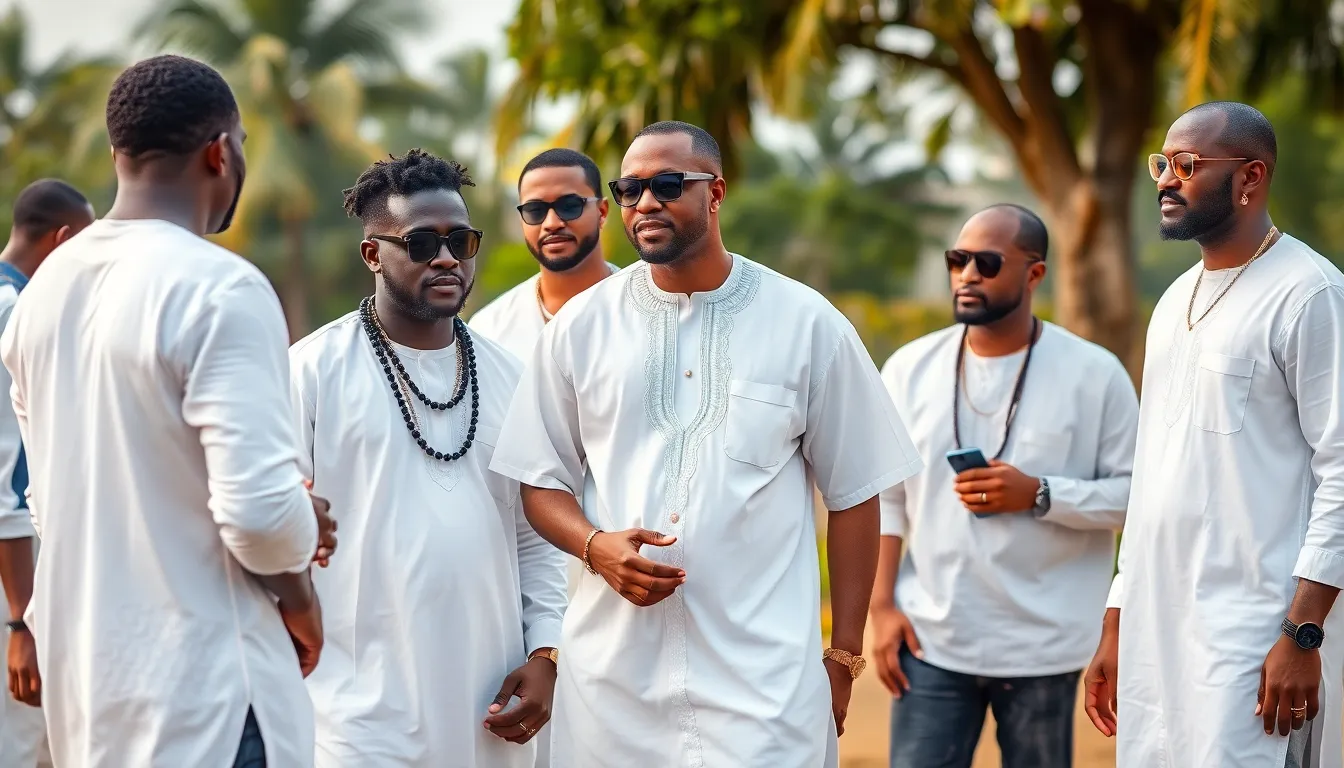
White native shirts offer Nigerian men the perfect balance between cultural heritage and modern comfort for everyday situations. These versatile pieces feature lightweight fabrics and clean designs that work beautifully for informal gatherings and daily activities.
Everyday Comfort Styles
Cotton and linen fabrics dominate our everyday white native shirt selections because they provide excellent breathability in Nigeria’s tropical climate. Minimal embroidery keeps these designs fresh and understated while maintaining their cultural significance. Simple white tunics offer the most comfortable option for daily wear, featuring soft materials that allow natural movement throughout the day.
Traditional patterns appear subtly on these casual pieces, often incorporated through delicate buttonwork or gentle collar detailing. Breathable construction ensures temperature regulation during long days, making these shirts ideal for extended wear. We’ve found that pairing these shirts with regular trousers or jeans creates an effortless look that bridges traditional and contemporary style.
Semi-Formal Office Options
Senator style white native shirts provide the perfect solution for professional environments where cultural expression meets business requirements. Structured cuts and customized fits create a polished appearance that commands respect in office settings. Intricate embroidery along the chest and collar areas adds sophisticated detailing without overwhelming the clean aesthetic.
Matching trouser sets complete these semi-formal looks, creating cohesive outfits that work exceptionally well in Nigerian business culture. Premium fabrics like quality cotton blends ensure these shirts maintain their crisp appearance throughout demanding workdays. Leather shoes and minimal accessories complement these pieces perfectly, creating a refined professional image that honors traditional craftsmanship.
Weekend Relaxed Fits
Loose fitting white native shirts and flowing agbadas become our go-to choices for comfortable weekend activities and social gatherings. Wide sleeves and generous cuts allow maximum comfort during leisure time while maintaining an elegant cultural presence. These relaxed styles work beautifully for casual weekend events, family gatherings, and informal social occasions.
Soft fabrics prioritize comfort over structure, ensuring these pieces feel as good as they look during extended wear. Breathable materials make these weekend options perfect for outdoor activities and warm weather socializing. Traditional accessories like Igbo velvet caps or Kufi hats in white or neutral tones enhance these relaxed looks while maintaining the cultural authenticity that makes these pieces so meaningful.
Essential Accessories to Complete White Nigerian Native Outfits
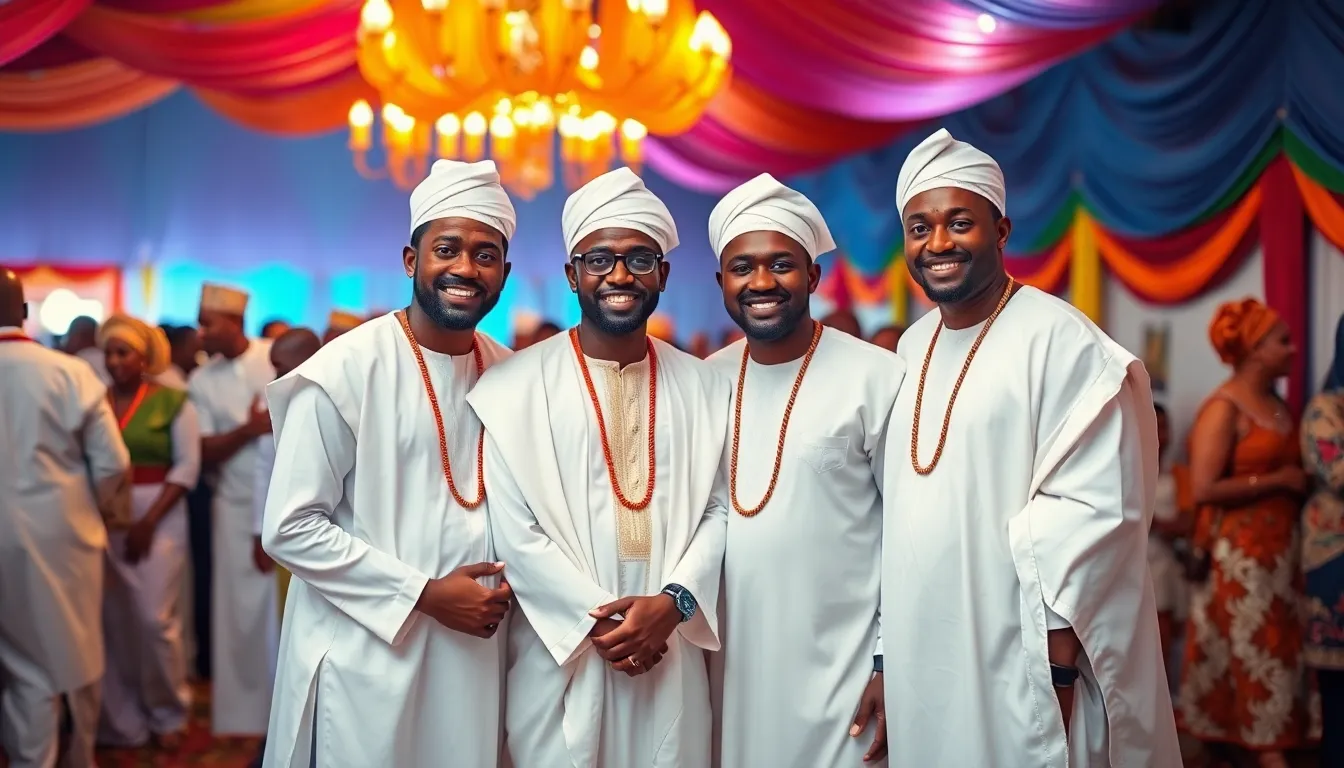
Completing your white Nigerian native ensemble requires carefully selected accessories that honor tradition while improving your overall appearance. We’ll explore the key elements that transform a simple outfit into a distinguished cultural statement.
Traditional Caps and Headwear
Fila caps represent the cornerstone of Yoruba traditional headwear, offering an elegant finish to white native outfits. These embroidered caps coordinate beautifully with white fabrics and signify cultural identity in formal settings.
Abeti aja caps feature distinctive flap designs that add sophistication to agbada and senator wear combinations. We recommend choosing caps with subtle embroidery that complements rather than competes with your outfit’s embellishments.
Igbo red caps provide ceremonial significance for exact cultural occasions, creating striking contrast against white native wear. Cultural events and traditional weddings often call for these distinguished headpieces that represent heritage and status.
Color coordination becomes essential when selecting traditional caps for white native outfits. Neutral tones like cream, gold, or subtle earth colors maintain the elegant aesthetic while respecting cultural authenticity.
Cultural Jewelry and Beads
Coral beads dominate Nigerian men’s traditional jewelry, particularly among Yoruba, Igbo, Edo, and Benin cultures. These vibrant accessories symbolize heritage and status while adding cultural depth to white native ensembles.
Glass bead necklaces offer affordable alternatives to genuine coral while maintaining traditional aesthetic appeal. We find these handcrafted pieces perfect for weddings and cultural celebrations where authenticity matters most.
| Bead Type | Cultural Significance | Occasions | Price Range |
|---|---|---|---|
| Genuine Coral | High status, spiritual protection | Weddings, festivals | Premium |
| Glass Coral | Cultural heritage, traditional style | Social events, ceremonies | Moderate |
| Cowrie Shell | Prosperity, cultural connection | Religious events, celebrations | Affordable |
Handmade beaded bracelets blend traditional craftsmanship with contemporary style preferences. These accessories complement white native shirts and casual dashiki outfits without overwhelming the overall look.
Cowrie shell accents enhance coral bead jewelry by adding cultural resonance and spiritual significance. Traditional ceremonies and religious events often feature these meaningful combinations that connect wearers to ancestral heritage.
Matching Footwear Options
Leather loafers provide polished sophistication for formal white native occasions like weddings and business events. Handmade options with intricate designs elevate agbada and senator wear to premium status levels.
Traditional leather sandals honor cultural authenticity while offering comfort during extended ceremonial events. These handcrafted pieces feature traditional designs that harmonize with white native wear aesthetics.
Slip on shoes offer convenience and elegance for semi formal occasions where white native shirts or casual dashiki outfits are appropriate. We recommend brown or black leather options that maintain sophisticated appearances.
Color coordination strategies focus on neutral tones that complement white native fabrics without creating visual competition. Brown, black, and white footwear choices create cohesive looks that respect traditional styling principles.
Quality leather construction ensures durability for special occasion wear while maintaining the refined appearance expected with premium white native outfits. Investment pieces in traditional footwear often become family heirlooms passed between generations.
Fabric Choices for White Nigerian Men’s Native Wear
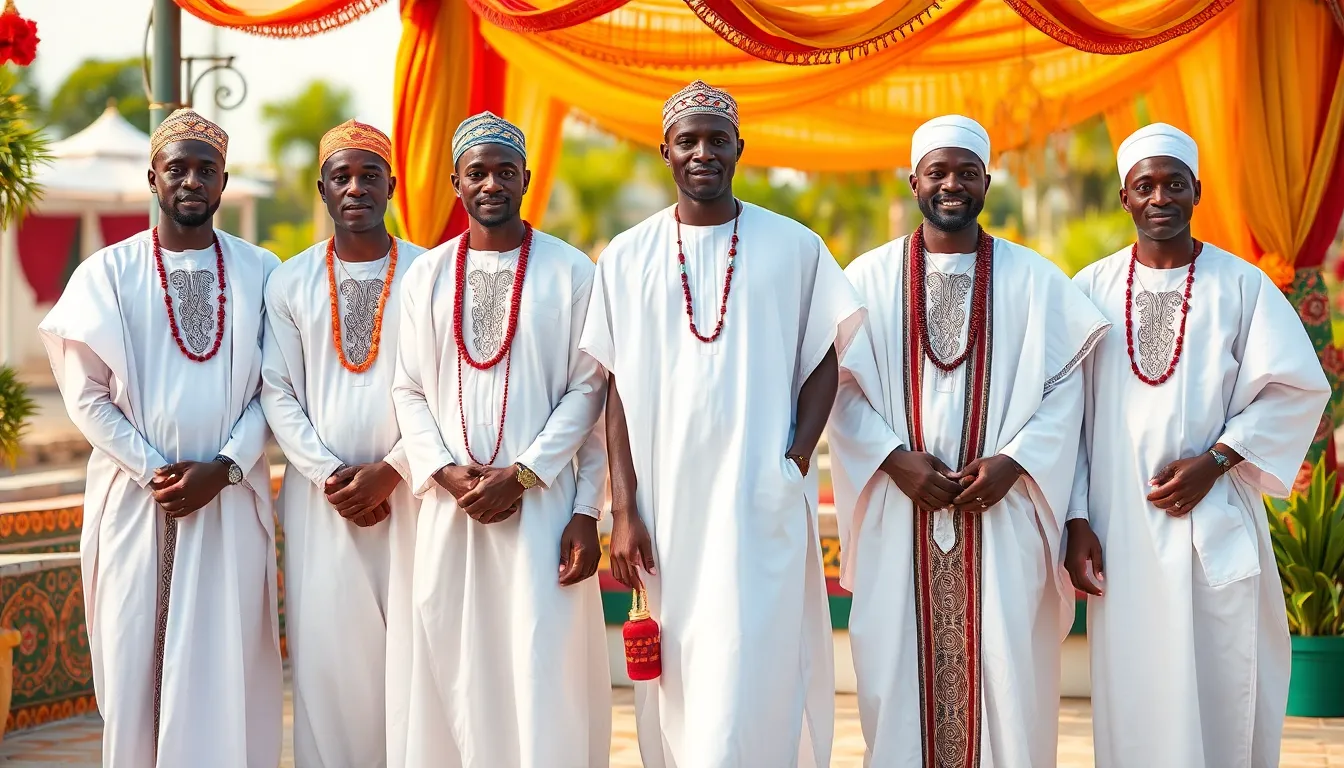
Selecting the right fabric transforms white Nigerian native wear from simple clothing into sophisticated cultural statements. We’ll explore the premium materials that bring both comfort and elegance to traditional Nigerian menswear.
Premium Cotton Materials
Cotton stands as the most versatile foundation for white Nigerian native wear, offering exceptional breathability perfect for our warm climate. Ankara cotton leads the selection with its vibrant designs and durability, making it ideal for both casual gatherings and formal celebrations. Cotton’s natural softness ensures all-day comfort while maintaining the crisp appearance that white native wear demands.
Daily wear becomes effortless with cotton’s easy maintenance requirements and resistance to frequent washing. Special occasions benefit from cotton’s ability to hold intricate embroidery and detailed embellishments without compromising the fabric’s integrity. Premium cotton varieties like Egyptian cotton elevate the overall quality, providing a luxurious feel that rivals more expensive materials.
Luxury Silk Options
Silk transforms white native wear into truly premium garments with its signature smooth texture and elegant sheen. Aso Oke represents the pinnacle of luxury silk craftsmanship, featuring hand-woven cotton and silk threads that create stunning traditional textiles. Sanyan silk offers remarkable smoothness and luster, making it perfect for formal events like weddings and cultural ceremonies.
Iseyin silk captivates with its unique diamond patterns and intricate weaving techniques that showcase traditional Nigerian artistry. Formal occasions call for these luxury silk options because they drape beautifully and catch light in ways that enhance the wearer’s presence. Wedding ceremonies and cultural festivals showcase silk’s ability to create memorable, photogenic moments that honor Nigerian heritage.
Durable Polyester Blends
Polyester blends deliver practical answers for men who need wrinkle-resistant white native wear without sacrificing style. Modern senator styles and kaftans benefit from polyester’s durability and ability to maintain sharp creases throughout long events. Business settings appreciate polyester blends because they require minimal maintenance while projecting professional polish.
Travel-friendly options emerge from polyester’s resistance to wrinkles and stains, making it ideal for men who attend events away from home. Care becomes simplified with polyester blends that can withstand regular washing and quick drying, perfect for busy professionals. Quality polyester blends maintain their white color longer than pure cotton, ensuring your native wear looks fresh after multiple wears.
Styling Tips for White Nigerian Native Wear
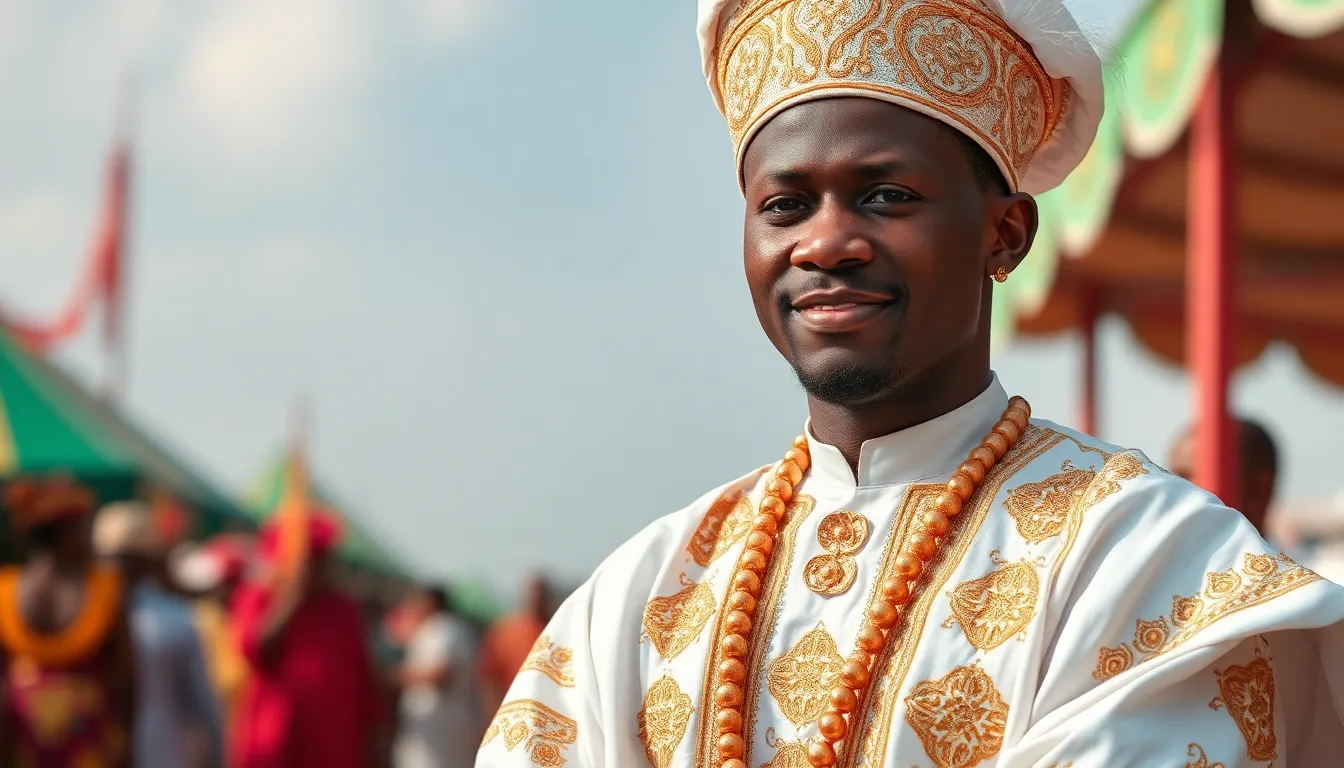
Mastering the art of styling white Nigerian native wear requires understanding the fundamental principles of color coordination, seasonal appropriateness, and body type considerations. We’ll explore how these elements work together to create sophisticated looks that honor cultural heritage while embracing modern fashion sensibilities.
Color Coordination Techniques
Metallic accents transform white native wear into stunning formal attire when we incorporate gold and silver elements through embroidery, buttons, and traditional caps like the Igbo Ozo cap. Brown leather accessories create a sophisticated foundation that complements white garments beautifully, with tan and nude leather shoes and belts providing the perfect finishing touches.
Strategic color pops enhance white outfits without overwhelming their elegant simplicity through carefully chosen accessories like beaded necklaces, colorful traditional hats, or patterned inner shirts. Navy blue accessories offer timeless contrast that works especially well for business settings, while deep green elements create subtle color blocking that maintains professional appeal.
Earth tone combinations ground white native wear in natural elegance when we pair these garments with brown, camel, or khaki accessories. Black accents provide dramatic contrast for evening events, though we recommend using them sparingly to maintain the outfit’s refined character.
Seasonal Styling Considerations
Warm weather styling maximizes white native wear’s natural advantages since these light fabrics reflect heat and provide excellent breathability in Nigeria’s tropical climate. Pure white garments work exceptionally well for summer weddings and festivals, where their cooling properties enhance comfort throughout long ceremonial events.
Evening adaptations require thoughtful layering when temperatures drop, with lightweight neutral jackets or earth toned shawls adding warmth without compromising the outfit’s sophisticated appearance. Cream and off white shades offer versatile alternatives for indoor occasions where pure white might appear too formal.
Seasonal fabric choices influence comfort and appearance significantly, with lighter cotton weaves performing best during hot months while slightly heavier fabrics provide better drape during cooler periods. Indoor events often call for more structured fabrics that maintain their shape under air conditioning.
Body Type Fitting Guidelines
Tall and slim men benefit from flowing Agbada gowns with wide sleeves that create an imposing, regal silhouette that enhances their natural height advantage. Generous fabric draping adds visual weight and presence, making these traditional garments ideal for formal ceremonies and cultural events.
Shorter or stockier builds achieve better proportions with customized Senator wear or structured two piece native sets that provide clean lines without overwhelming their frame. Well fitted garments create elongating effects that enhance overall appearance and confidence.
Optimal proportions emerge when tunic length falls just below the hip, creating visual balance that flatters most body types while maintaining traditional styling principles. Fabrics with slight stretch or excellent drape enhance comfort and movement without clinging inappropriately.
Structured fits work best for business settings where sharp tailoring creates professional presence, while looser cuts suit cultural celebrations where traditional silhouettes take precedence over contemporary fashion trends.
Care and Maintenance of White Nigerian Native Clothing
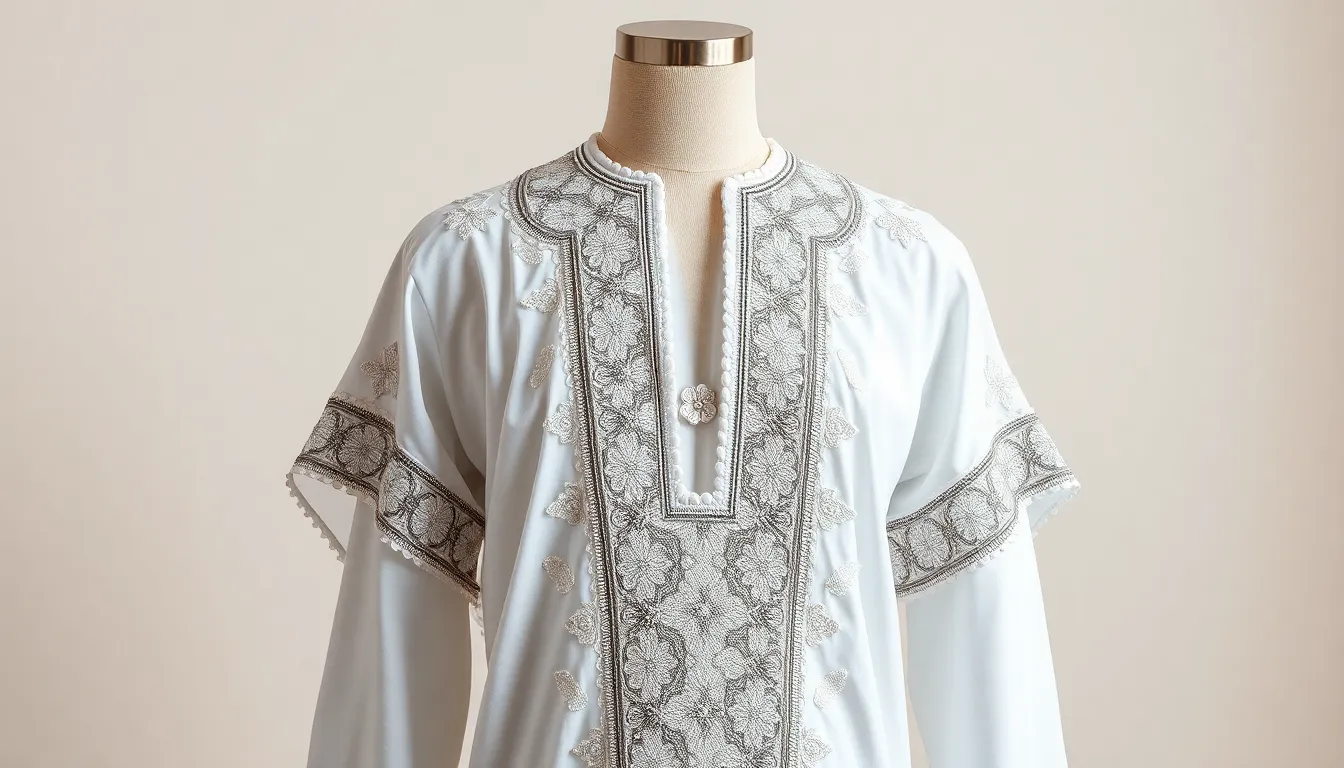
Preserving the pristine appearance of white Nigerian native wear requires specialized care techniques that protect delicate fabrics and intricate embellishments. We’ll guide you through essential maintenance practices that keep your cultural garments looking elegant for years.
Proper Washing Techniques
Hand washing remains the safest method for cleaning white Nigerian native attire like agbada, lace, and Ankara fabrics. Cold or warm water combined with mild detergent preserves fabric integrity while protecting delicate embroidery and embellishments from damage.
Machine washing requires extreme caution when handling these precious garments. Use gentle or no-spin cycles with water temperatures not exceeding 30°C to prevent fabric deformation and maintain the garment’s original shape.
Avoid harsh detergents and bleach completely as these chemicals cause permanent fabric damage and color fading that ruins the pristine white appearance. Gentle soap formulations work best for maintaining fabric quality without compromising the material’s natural properties.
Air drying in shaded areas prevents uneven fading that direct sunlight often causes on wet garments. Hang your white native clothing in well-ventilated spaces using plastic clips that won’t leave permanent marks on the fabric.
Professional dry cleaning becomes essential for heavily embellished or valuable pieces that require specialized care. Seek cleaners experienced with West African fabrics who understand the unique requirements of traditional Nigerian garments.
Storage Best Practices
Complete drying before storage prevents mildew development and eliminates odors that can permanently damage your white native clothing. Moisture trapped in stored garments creates ideal conditions for bacterial growth and fabric deterioration.
Cool, dry storage locations protect against yellowing and fabric weakening that humidity and direct sunlight cause over time. Temperature-controlled environments maintain fabric stability and preserve the brilliant white color.
Garment bags provide essential protection against dust accumulation and pest damage that can occur during long-term storage. Quality storage bags create barriers that keep your cultural attire pristine between uses.
Regular airing and gentle brushing maintain freshness without requiring frequent washing that can stress delicate fabrics. Soft brushes remove surface dust while allowing fabrics to breathe naturally.
Stain Prevention Methods
Immediate stain treatment prevents permanent discoloration that becomes impossible to remove once set into fabric fibers. Blot stains gently with clean, white cloths rather than rubbing, which embeds stains deeper into the material.
Mild, alcohol-free cleaners work best for spot cleaning delicate white Nigerian fabrics without causing additional damage. Test cleaning products on inconspicuous areas first to ensure they won’t cause discoloration or fabric weakness.
Avoiding contact with oils, perfumes, and colored substances prevents stains that can permanently mar the pristine appearance of white native wear. Apply fragrances and oils before dressing to minimize direct contact with your garments.
Protective measures during wear include using napkins during meals and avoiding activities that might expose your white native clothing to potential staining agents. Prevention requires significantly less effort than stain removal after the fact.
Conclusion
White native wear represents more than just fashion for Nigerian men—it’s a powerful statement of cultural identity and refined taste. We’ve seen how these timeless pieces seamlessly bridge traditional heritage with contemporary style demands.
The versatility of white native clothing makes it an essential wardrobe investment. Whether you’re attending a wedding ceremony or heading to a business meeting these garments offer the perfect blend of comfort and sophistication.
With proper care and thoughtful styling white native wear will serve you well for years to come. We encourage you to explore these beautiful options and discover how they can elevate your personal style while honoring Nigerian cultural traditions.
Frequently Asked Questions
What is the significance of white native wear in Nigerian men’s fashion?
White native wear holds deep cultural significance in Nigerian fashion, symbolizing purity, peace, and spiritual connection. These garments represent traditional heritage while offering sophisticated options for modern men. White clothing is particularly meaningful during weddings, religious ceremonies, and cultural celebrations, where it enhances the spiritual and social importance of significant life events.
What are the most popular types of white Nigerian native wear for men?
The most popular white Nigerian native wear includes the agbada (flowing robe with wide sleeves), dashiki (traditional shirt with symbolic patterns), kaftan (versatile loose-fitting garment), senator wear (formal tunic and trouser set), and buba and sokoto combination. Each style offers different levels of formality and cultural expression.
How do I choose the right fabric for white Nigerian native wear?
Premium cotton, particularly Ankara cotton, is ideal for breathability and durability. Luxury silk options like Aso Oke and Sanyan silk provide elegance for formal events. Polyester blends offer wrinkle-resistant properties for busy professionals. Consider the occasion, climate, and desired comfort level when selecting fabrics.
What accessories complement white Nigerian native outfits?
Traditional caps like fila and abeti aja add cultural authenticity and elegance. Coral beads and glass bead necklaces enhance cultural depth. Leather loafers, traditional sandals, and quality dress shoes provide polished sophistication. Choose accessories that match the formality of your outfit and occasion.
How should I care for white Nigerian native clothing?
Hand wash with mild detergent in cold water to protect delicate fabrics and embellishments. Air dry in shaded areas to prevent yellowing. For heavily embellished pieces, use professional dry cleaning. Store garments in breathable cotton bags in cool, dry places to prevent mildew and maintain pristine appearance.
Can white native wear be worn for business occasions?
Yes, white senator wear and structured kaftans are excellent for business formal and business casual settings. Choose minimalist designs with quality tailoring, pair with polished leather shoes, and avoid overly decorative elements. The key is maintaining professional sophistication while honoring cultural heritage.
What’s the difference between traditional and modern white native wear styles?
Traditional styles feature authentic cultural patterns, hand-embroidered designs, and ceremonial elements. Modern interpretations incorporate sleek cuts, minimalist aesthetics, lighter fabrics, and contemporary styling that appeals to younger generations while preserving the garment’s cultural essence and significance.
How do I style white native wear for different body types?
Choose flowing agbadas for broader builds to create elegant silhouettes. Fitted senator wear flatters slimmer frames. Shorter men should opt for cropped styles, while taller men can wear longer garments. Focus on proper fit and proportions to ensure a polished, flattering appearance.
